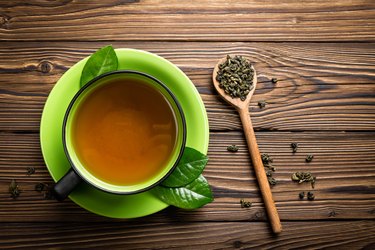
Coffee and green tea have different flavors but similar health benefits. Insomnia, jitters, anxiety and other green tea side effects resemble those of coffee as both beverages contain caffeine. Tea, however, is significantly lower in caffeine and gentler on the digestive system.
Tip
Green tea provides less caffeine than coffee but has similar health benefits. When consumed as part of a balanced diet, it may lower your risk of cardiovascular disease and certain types of cancer.
Video of the Day
Is Caffeine Good for You?
Drinking either coffee or green tea gives you a boost of energy. But you don't need to consume them for practical purposes as they taste delicious. Your drink of choice depends largely on what flavor you prefer. For some people, the taste of green tea can be too bitter.
Video of the Day
Both beverages are acidic, according to the American Dental Association. Therefore, they may damage the tooth enamel when consumed regularly. Furthermore, both coffee and green tea contain caffeine, which has its share of side effects.
Coffee's and green tea's side effects are largely due to this compound. Caffeine tops the list as the most popular psychostimulant worldwide and is most commonly consumed from coffee, according to a January 2015 study published in Current Neuropharmacology.
When you drink caffeine, you feel more alert and focused. That can be helpful if you're trying to study or work until late. This stimulant will also fuel your workouts and ward off fatigue.
Read more: 14 Legit Ways Coffee Can Boost Your Health
As the American Council on Exercise points out, caffeine may benefit strength and endurance athletes when consumed in moderate amounts. For example, it can boost your energy when performing compound exercises like the bench press as well as during a short 60-second bike sprint.
Since both coffee and green tea contain this stimulant, the benefits of caffeine will be the same, regardless of which beverage you choose. Each drink provides different amounts of caffeine, though. An 8-ounce cup of green or black tea delivers 30 to 50 milligrams of caffeine, while the same amount of coffee has 80 to 100 milligrams, according to the Food and Drug Administration (FDA).
Green Tea Side Effects
The amount of caffeine in each drink depends on the type of coffee bean or tea leaf and the brewing process. There are also different types of coffee drinks, such as espresso and latte. While caffeine has numerous health benefits, it can be dangerous when consumed in large doses. Approximately 400 milligrams is the most you should have in a day, states the FDA, but those who are sensitive to stimulants might need less.
Green tea's side effects are milder than those of coffee since there is less caffeine. When consumed in excess, coffee may cause jitters, anxiety, nausea and heart palpitations. If you're a coffee drinker and experience these symptoms, consider switching to green tea. It has almost half the amount of caffeine, which means that its side effects are less noticeable.
Drinking a moderate amount of coffee is healthy, but green tea has unique benefits. A January 2016 study published in the International Journal of Cardiology has found that drinking just one cup of green tea per day lowered the risk of heart attacks. Subjects who drank 10 cups per day had lower LDL (the "bad") cholesterol levels than those who drank fewer than 3 cups per day.
Benefits of Coffee and Tea
Caffeine isn't the only substance responsible for the health benefits of coffee and green tea. These beverages are rich in antioxidants and other bioactive compounds with therapeutic action. Harvard Health Publishing explains that catechins and epicatechins might be responsible for many of the health benefits of green tea.
Flavonoids, such as catechins and other antioxidants, are naturally occurring compounds found in plants. When consumed as part of a healthy diet, they may help reduce inflammation and prevent plaque buildup on the artery walls.
The benefits of coffee don't necessarily come from caffeine. According to a July 2017 research paper published in Planta Medica, decaffeinated coffee may have beneficial effects similar to those of regular coffee.
You might want to switch from coffee to tea or vice-versa because of the taste or caffeine content, but there is some evidence that these drinks have slightly different health benefits due to their unique nutritional content.
For example, a January 2018 study published in the European Journal of Epidemiology has found that men who drank large amounts of tea had a lower risk of cardiovascular disease and some cancers. Interestingly, the same was not true for women, who benefited more from coffee.
- European Journal of Epidemiology: "Coffee or Tea? A Prospective Cohort Study on the Associations of Coffee and Tea Intake With Overall and Cause-Specific Mortality in Men Versus Women"
- British Medical Journal: "Coffee Consumption and Health: Umbrella Review of Meta-Analyses of Multiple Health Outcomes"
- Harvard Health Publishing: "Flavonoids: The Secret to Health Benefits of Drinking Black and Green Tea?"
- International Journal of Cardiology: "Green Tea Consumption and Risk of Cardiovascular and Ischemic Related Diseases: A Meta-Analysis"
- Food and Drug Administration: "Spilling the Beans: How Much Caffeine Is Too Much?"
- American Council on Exercise: "How Caffeine Affects Athletic Performance"
- Current Neuropharmacology: "Caffeine: Cognitive and Physical Performance Enhancer or Psychoactive Drug?"
- American Dental Association: "The pH of Beverages in the United States"
- Planta Medica: "The Impact of Coffee on Health"
- The Huffington Post: Is Coffee Bad or Good for Your Health? Two Experts Debate